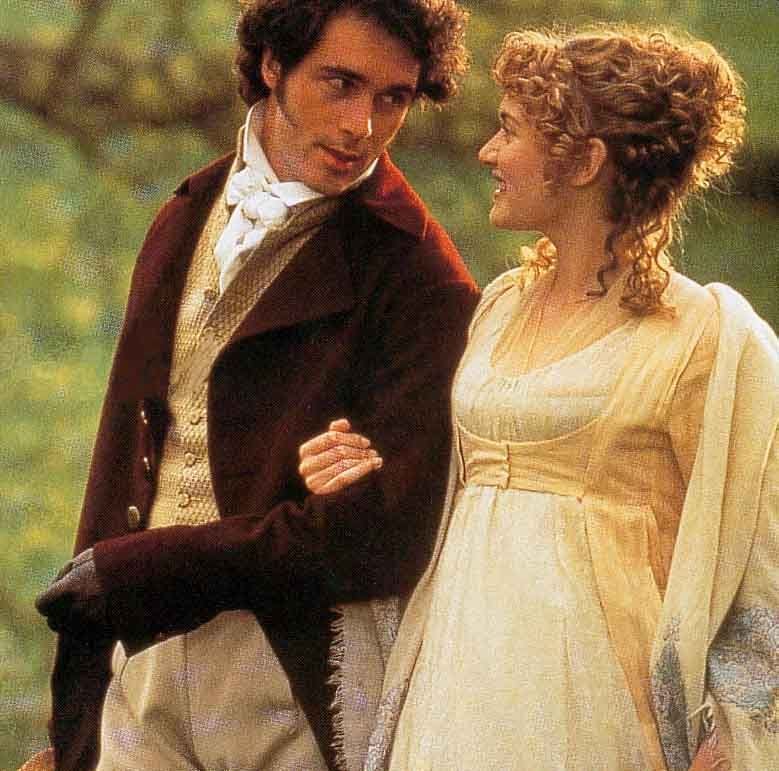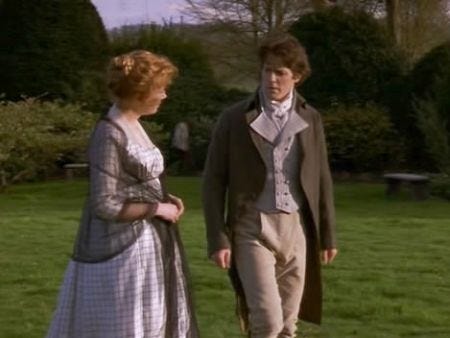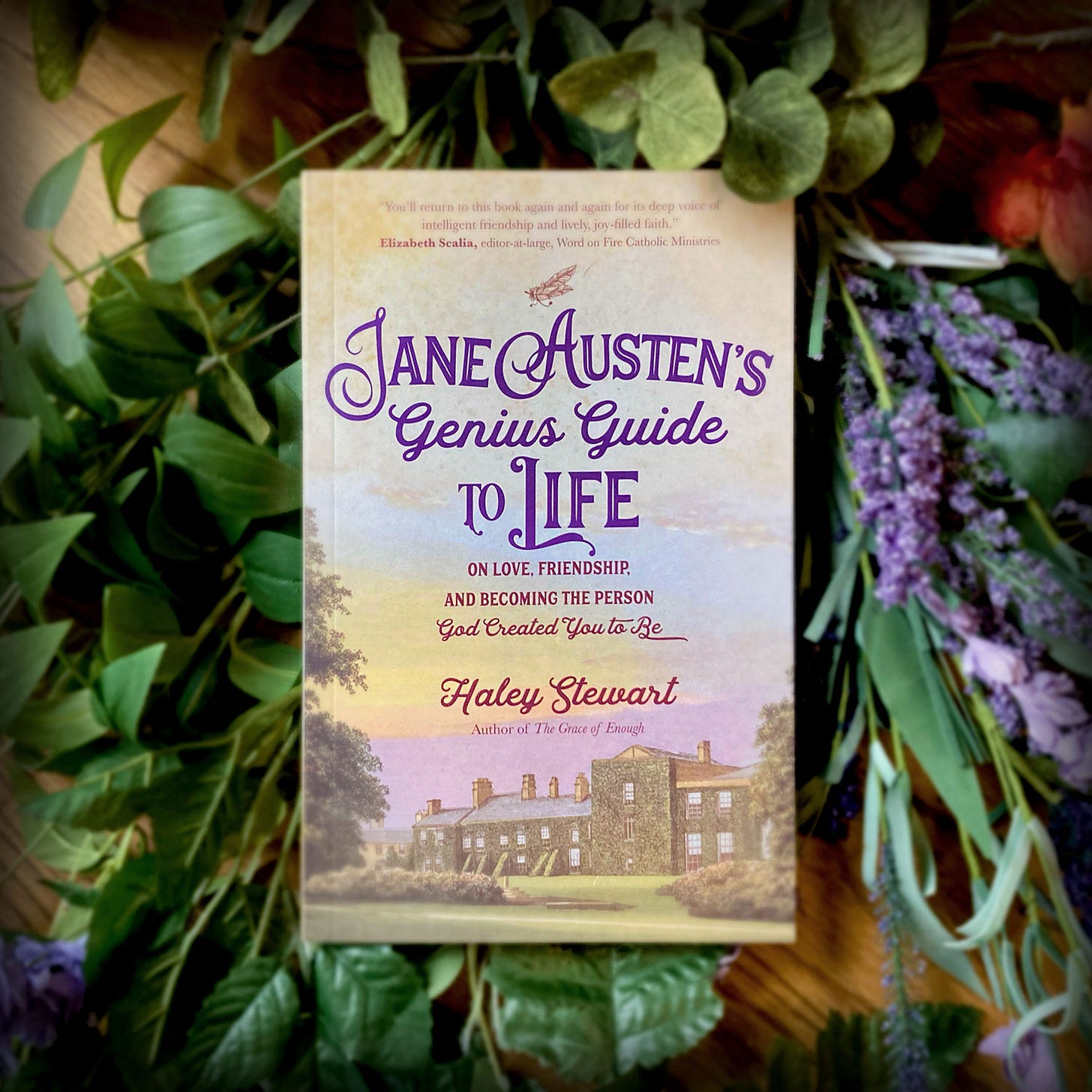If you’re new to this Substack, one of the things I’m offering subscribers in 2023 is A Year with Jane. We’re reading through Austen’s six novels this year and Sense & Sensibility is our read for August and September.
This is a reader-supported publication. To receive new posts and support my work, consider becoming a free or paid subscriber.
A Mystery and a Mystery Solved
In this week’s reading of Sense & Sensibility, Willoughby disappears. Marianne is beside herself! Elinor is perplexed. And Mrs. Dashwood is eager to make excuses for him.
Why did he leave so suddenly? Why does the attachment between Marianne and Willoughby seem vague? We don’t know yet.
The news isn’t sunny for Elinor’s love life, either. Edward takes his sweet time in visiting Barton Cottage. When he does arrive, he seems both miserable and cautious not to single out Elinor and to avoid moments when they are alone. Then there’s the matter of the ring with someone’s hair.
No one has ever looked more uncomfortable than Hugh Grant as Edward Ferrars in the 1995 adaptation. But poor Edward is uncomfortable for a good reason. We find out from Lucy Steele that he’s engaged to be married to her! So whether he’s in love with Elinor or not, he isn’t at liberty to pursue her.
The two sisters react so differently to these disappointments. Marianne considers her hysterical misery over Willoughby’s departure to be a badge of honor. Elinor takes great pains to not give her emotions free rein. She is distressed, shocked, and miserable at the news Lucy shares, but how she will behave is very different from Marianne.
Discussion Question: Is Edward’s behavior toward Elinor acceptable? Should he have done something differently or been more open with her about his engagement? (Chime in by replying to this post.)
Reading schedule:
Week of August 5th:
Gather your books. There are many editions out there, so just grab what’s on your shelf or at the local library. And if you enjoy audiobooks, this is an excellent novel to enjoy with a great narrator. My favorite for this novel is Juliet Stevenson’s audiobook version. Grab Jane Austen’s Genius Guide to Life from Ave Maria Press (use STEWART20 for 20% off) or from Amazon.
If you didn’t start reading with us in January, you may want to catch up by reading the Introduction and Chapters 1-4 of Jane Austen’s Genius Guide to Life to set the stage.
Week of August 13th:
Chapters 1-11 of Sense & Sensibility
Week of August 20th:
Chapters 12-22 of Sense & Sensibility
Week of August 27th:
Chapters 23-29 of Sense & Sensibility
Week of September 3rd:
Chapters 30-36 of Sense & Sensibility
Week of September 10th:
Chapters 37-43 of Sense & Sensibility
Week of September 17th:
Chapters 44-50 of Sense & Sensibility
Week of September 24th:
Chapter 4 of Jane Austen’s Genius Guide to Life
Caveat:
On the reading schedule I have suggested reading the chapter about Mansfield Park after finishing the novel. This is because as a reader I hate spoilers. But if you’ve already read the novel or are familiar with the story and want a resource to help you dive deeper as you re-read it, feel free to read Chapter 5 of Jane Austen’s Genius Guide to Life first.
I’ll be sending out weekly reflections and discussion questions to consider as you read. If you want to read faster or slower, go for it. This is fun, not homework.
If you know someone who would enjoy reading Austen with us for our Year of Jane, please share this post with him/her!
All Jane Austen book club emails and 2023 emails will continue to be available with a free subscription. But this is a reader supported effort. Consider supporting this literary Substack by upgrading to a paid subscription.
And if you know someone who would love this virtual book club, please share with them:
Enjoy reading the next few chapters of Sense & Sensibility!
Haley
(Editor of Word on Fire Spark, Author, Former Podcaster)
Haley’s Children’s Mystery Series about Mouse Nuns
Haley’s Book on Jane Austen’s Novels
Haley’s Book about Radical Simplicity





I think the problem as a modern reader is .... that I'm a modern reader. In these books, I always want them to just ask the question or just write them a letter or something. But of course, it's totally inappropriate for you to write a letter to someone you're not engaged to. And it's inappropriate to be so direct. I would be totally frustrated in that time frame.
Could Edward really have done anything differently? I think probably not. His wearing the hair ring was probably to clue Elinor in on his being attached to someone else? She seemed confused about how he got her hair to make the ring. If she didn't give him the hair, shouldn't that have tipped her off that it was someone else's hair?
My sense was that he didn't really have the intention to stop by the cottage and instead just got caught being in the area. If he had intended to pursue Elinor, he would have come right away. I think he was trying to do his best to not lead Elinor on, while still maintaining the relationship. He was their brother in law, in fact, so a visit is appropriate in that way.
I honestly think he was doing the best he could. Truly, if he had made a commitment to another and had just broken it because something better came along, he probably wouldn't be the right person for Elinor anyway. She seems to take commitments seriously. If he had dissolved his relationship with Lucy because he liked Elinor more, and Elinor had found out, I wonder whether she would have called off the engagement herself because of his poor character.
I think the mystery of why people are acting the way they are in this book is a big part of the charm. Plus it reveals the constancy or lack thereof of Elinor and Marianne. So if it had been written differently, I am not sure I would have liked it as well.
I think the best way to answer this question is to look at Edward’s own self-assessment and explanation at the end of the book (spoilers ahead!). Elinor “scolds” for the “imprudence” of spending so much time with them when he “must have felt his own inconstancy.” Edmund asserts that, initially, he trusted to the fact of his engagement to “keep my heart as safe and sacred as my honor.” Because of this, he convinces himself that his regard for Elinor is merely friendship, and it isn’t until he starts mentally comparing Lucy and Elinor that he realizes how far gone he was. At that point, he admits he was wrong to continue spending time with the Dashwoods, a wrong he justified by the “expediency” of believing “I am doing no injury to anybody but myself.” So, Edward knew (initially subconsciously and later consciously) that it was wrong to spend time with someone who he was coming to care more for than his fiancé. He didn’t have the strength of character to stay away, and convinced himself it was ok because he was the only one being hurt. But that’s a pretty big risk to take when there’s no way of knowing for sure Elinor isn’t interested/he isn’t raising expectations. And as a want to be clergyman you’d think he’d keep in mind passages about “committing adultery in the heart.” That isn’t to say I think Edward did any sort of fantasizing or deliberate acts of mental unfaithfulness; he can’t help his feelings. But as soon as they were apparent he should have left (as he owns) in order to remove a serious source of temptation to himself and potential hurt to another (Elinor).